Why do most foreigners leave Japan?
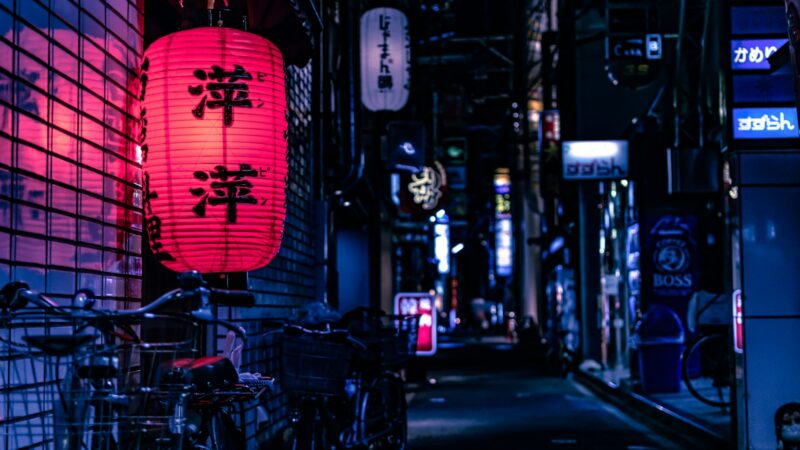
“They would be absolutely terrible to live with. I’m gonna leave Japan next week. I have 43 more days. They gave me like two months to leave the country.”
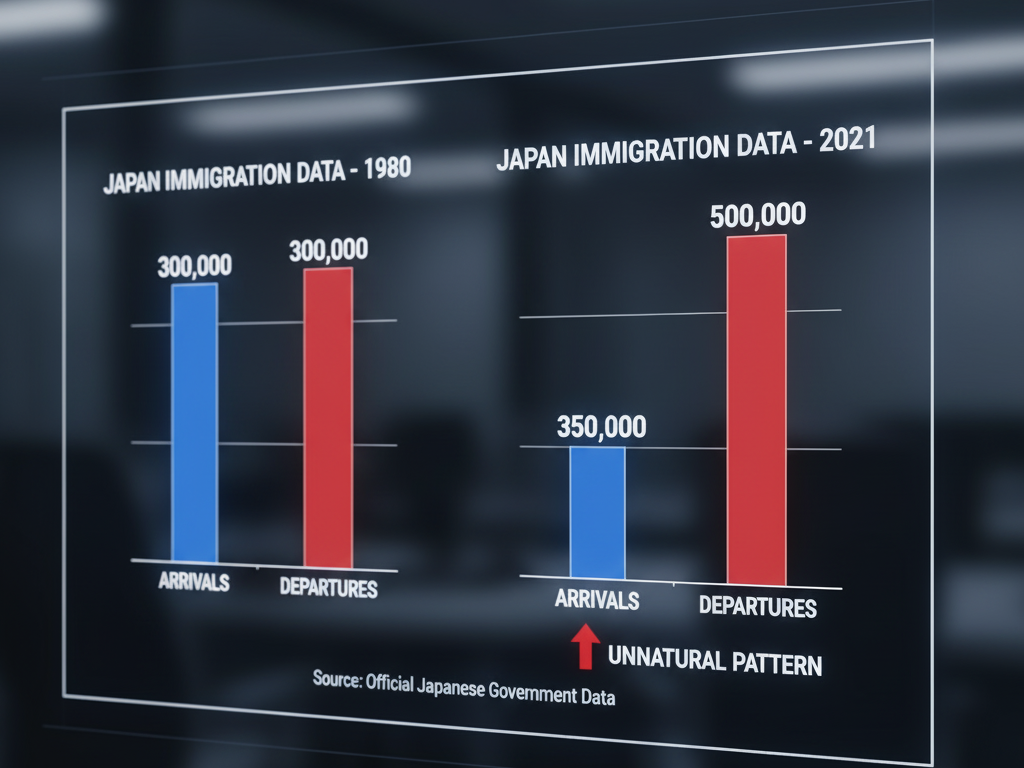
Take a close look at this graph. You will see an unnatural pattern in Japan’s immigration data. This is the official data for 1980 and 2021, in which for both years, almost as many foreigners who came to Japan also returned to their home countries. In fact, in 2021, only 3.5 lakh (350,000) immigrants came to Japan, but 5 lakh (500,000) foreigners returned from Japan. Exactly the same pattern is visible in this other international data. The Organisation for Economic Co-operation and Development (OECD) also found in its research that despite all visa permits being indefinitely renewable, 60% of high-skilled professionals do not want to stay in Japan for more than 2 years. You will also find many such news headlines and public interviews in which foreigners themselves are saying that they are leaving Japan for good.
But you must have noticed one more thing: the reasons for all of them are very different from each other. “You know, it’s a work, work, work, work, work-oriented culture. You will never be Japanese, it doesn’t matter how much Japanese you speak. If you get naturalized as a citizen, it doesn’t matter.”
So what is the truth? And no, it’s not at all that no one wants to go to Japan or that the overall immigration rate in Japan is decreasing. No, in 2023, 375,000, which is the highest number of foreigners to date, immigrated to settle in Japan, and for the last three years, this number has been continuously increasing. On top of that, due to Japan’s aging population and low birth rates, the government there is also incentivizing immigration through various schemes so that more and more foreigners settle in their country. And that is why people from many countries like China, Korea, and Vietnam still arrive in Japan with big dreams for higher studies, for a job, or just for a better standard of living. But what happens to them there that in just one or two years, they are forced to leave Japan and return to their own country?
Why do foreigners feel unwelcome or face discrimination in Japan?
A year ago, an American blogger, A-ming Pearl, asked the people of Japan a simple question in her YouTube video. “Why would Japanese people rather stand on a crowded train than sit next to a foreigner?” Why would any Japanese person stand in a crowded train but not sit next to an American girl?
Many immigrants say that Japanese landlords straight up say that in their houses, “dogs, cats, and foreigners are not allowed.” Or if they go to a store, the Japanese staff follows them to see what they are doing. But this does not happen with other customers. And recently 2025, anti-immigration protests have also increased in Japan. Just last month, in a protest, many Japanese took to the streets to raise their voices against foreign immigrants. Look, the thing is, unlike the US or the UK, Japan is an extremely homogeneous society where 98% of the population is ethnically Japanese. So is blatant racism against outsiders a reason why foreigners are not feeling comfortably accepted in Japan?
What is Japan’s work culture really like for foreign employees?
Every year, 2.5 lakh (250,000) foreigners come to Japan solely for better job opportunities. But this is the situation of Japanese nationals themselves. Seven years ago, when documentary filmmaker Allegra Pacheco went to Japan, she observed that Japanese employees work so much that they step out of the office and sleep right on the street. But this is more like fainting from fatigue than sleep. “These are not dead bodies. This is not a crime scene. These are businessmen passed out on the streets of Tokyo after a long day at the office.”
There are some extreme cases of this, which in Japan is called “karoshi,” meaning death due to overwork. “In Japanese, we have this expression called karoshi, which is literally death by overwork.” According to official data, 400 people die every year due to karoshi-related heart attacks and strokes. But experts believe the actual figure is 20,000. Now, 20,000 deaths not because of some disease, but due to overwork to the point of complete exhaustion.
But the most shocking thing is that in many cases, this overwork is consensual. That is, Japanese employees themselves do extra work of their own free will. For example, in 2021, Panasonic, on a trial basis, gave all its 63,000 employees a three-day weekly off.
But guess how many people out of 63,000 employees accepted this offer?
Only 150 people. That is, only 0.24% of people. Actually, Japanese employees are the worst at taking leaves because taking a day off is considered culturally quite shameful there. In Japan, work is not just a duty or responsibility but a kind of passion that shows loyalty towards the company. And because Japanese are culturally extremely loyal, in many cases, working overtime here is an employee’s own personal choice.
In a 2018 survey, some employees were asked why they don’t want to take their holidays even when they have them, and you won’t believe these were their answers:
“We feel awkward when colleagues are working and we are on holiday.“
“Due to the office culture and atmosphere, I can’t even ask for leave.” “No one else can do my work, that’s why I can’t take leave.“
“Duties are not well-defined, and that’s why if I take leave, the work of the entire department will stop.“
Now, add to all these reasons that because of this intense work culture, offices also greatly discourage paid leaves. According to official data published in CNBC, Japan is the country with the longest working hours in the world, where one in every four companies makes its employees work more than 80 hours of overtime per month, that too unpaid.
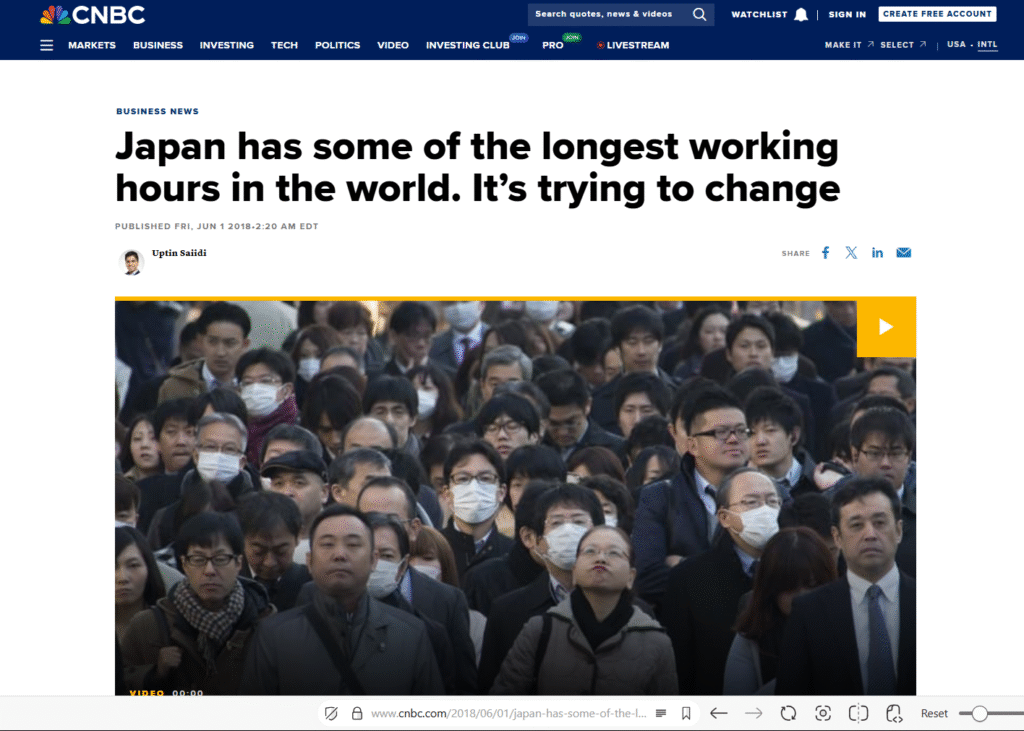
And taking paid leaves is also discouraged. For example, in Japan, a four-week “papa-kyuka” or paternity leave is legally mandatory. But data from the Health Ministry itself shows that one in every four Japanese men faced office harassment after taking paternity leave. Literally, after taking leave, 20% of employees faced bullying from superiors. Almost 17% of employees had their pay cut for some reason or another, and 10% were even demoted.
And that’s why for many foreigners, this intense work environment of Japan becomes a cultural shock. Because in Europe and Western countries, it’s the exact opposite. There, work is considered just one aspect of life, and work-life balance is proactively maintained. “I get home early, it’s like I have a good balance.” In a German survey, 28% of foreigners stated that they are leaving Japan because they are unable to acclimatize to the harsh working environment here. In fact, apart from the work culture, there are many other challenges, like foreigners usually don’t get salary hikes or promotions as frequently. In a survey by Nippon News, foreigners were asked what the most disappointing factor of working in Japan is. 30% of foreigners said that companies do not give them promotions or salary hikes.
Now, completely the opposite, there is one sector where employees are getting salaries two to three times higher than the national average and which has currently become Japan’s most in-demand sector, and that is Data Science, and that too especially for Indians. Because recently, as you may know, a deal has been signed between the two countries in which the Japanese government is going to offer jobs to 5 lakh (500,000) Indian workers by 2030. Especially highly skilled IT and tech engineering jobs, which, by the way, there is a big shortage of there.
Do you need to speak Japanese to live and work in Japan?
Apart from this, here, unlike many countries where English is used almost like a second language, in Japan, if you don’t know Japanese, it will be very difficult for you to find a job or to adjust and be successful in it. Because here, job interviews, onboarding, documents, HR discussions, and even Excel and emails are written in Japanese. Basically, there is a five-level language proficiency test here, from N1 to N5. N5 is the most basic, meaning you can handle everyday communication, that basic. And N1 means you can write, read, speak fluently, etc. But mostly in companies, N1 or N2 level Japanese is mandatory. “Certain companies don’t prefer you as a candidate because they require N2 and above, N2 and N1.”
In general, too, if you don’t know the Japanese language, surviving here becomes almost impossible. Because everything is written in Japanese. And I have had that experience. When I went to Japan for the YouTube Creator Summit, I literally got lost in Tokyo’s Shinjuku metro station. My phone wasn’t working properly, and I was not able to locate my hotel. Everywhere I looked, everything was written only in Japanese. But thankfully, people are extremely good. They helped me.
Why is it so hard for foreigners to rent an apartment in Japan?
Honestly, even before a job, a foreign immigrant’s biggest struggle is renting a house in Japan. “Sorry, we accept only Japanese.” “Dogs, cats, and foreigners are not allowed.” In 2015, a 20-year-old European student filed a case in the Kyoto District Legal Affairs Bureau on the issue of housing discrimination against foreigners happening in Japan. But the bureau rejected the complaint, giving the justification that whether to give a flat or not is the owner’s personal choice, not discrimination. But even today, according to a recent survey by Japan’s Ministry of Justice itself, almost 40% of foreigners have faced housing discrimination in Japan at least once in the last 5 years. “40% of foreigners who have looked for it have been told no because they’re foreign, even if they have Japanese language ability.”
This is called “dame” in Japan, meaning the “no foreigner” culture. “And Japan really needs you. It’s hard to find shoes. I’m trying to get like an apartment, possibly, but it’s actually much more difficult than I thought. I think it’s mainly because I’m a foreigner, and they say it’s because of the language. I feel always I will be in a different category.” This is not against any specific race or nationality. But again, there are many cultural reasons why Japanese people do not want to rent their houses to foreigners.
So Japan’s Ministry of Justice, the Japan Rental Housing Management Association, and a top HR research and development organization conducted a nationwide survey. They asked all foreigners what reasons they think Japanese people don’t give them houses. What have they or other foreigners done? The answer was quite interesting. They said that most of the complaints are about not following the disciplined Japanese culture. For example, these are the top three complaints: not disposing of garbage properly, making noise, and not following Japanese rules and regulations.
What are the strictest cultural rules foreigners must follow in Japan?
Now, as an Outsider, you might be thinking, how can anyone discriminate over such small things? But this matter is not as small as it sounds. In Japan, disposing of household garbage is no less than rocket science. Look at this chart. Here, first, five categories of garbage have been made, and under them, there are 50 different subtypes which have to be read correctly, remembered, and exactly that kind of garbage has to be thrown in that specific bin. For example, if you want to dispose of waste paper, you have to make separate bundles of newspaper, cartons, and magazines to dispose of them. Each bundle should be smaller than 50 cm and lighter than 10 kg. It has to be tied tightly with a string. If by mistake, plastic-coated paper, invitation cards, or coated cups get into it, you can be fined.
Also, garbage is not collected daily there. Kitchen waste is collected only twice a week. And all the other garbage is collected only twice a month, as written in the chart. Also, you cannot use any random plastic bag. You have to buy color-coded garbage bags from the store, which are usually quite expensive. Just imagine, for foreigners, like us Indians, this system will seem very complex. But rules are rules, and it is very strict in Japan. If anything goes wrong, the municipality leaves the garbage there and you also have to pay a fine of 2,000 yen.
Besides this, there are many such disciplinary rules, like after nightfall, you cannot make noise above 45 decibels. 45 decibels means the sound of two people talking; if the noise is louder than that, neighbors can complain to the police. “My neighbor complained about me that there is a sound of walking coming from your house… A letter came to the house. After seeing the letter, I replied that we won’t do it from now on.” And you know that Europeans and Americans, and even to some extent Indians, like to have house parties. So such a loud party cannot happen in Japan. Talking on the phone is not even allowed on Japanese trains. In India, people are on their phones even while driving or crossing the road. This is considered rude and undisciplined. “Excuse me, sir. Japanese people don’t make calls in… Japanese people don’t make a call in the train.” In Japan, even a basic thing like cycle riding has strict rules, and if you don’t follow them, you can go to jail.
Why is it difficult for foreigners to make friends and socialize in Japan?
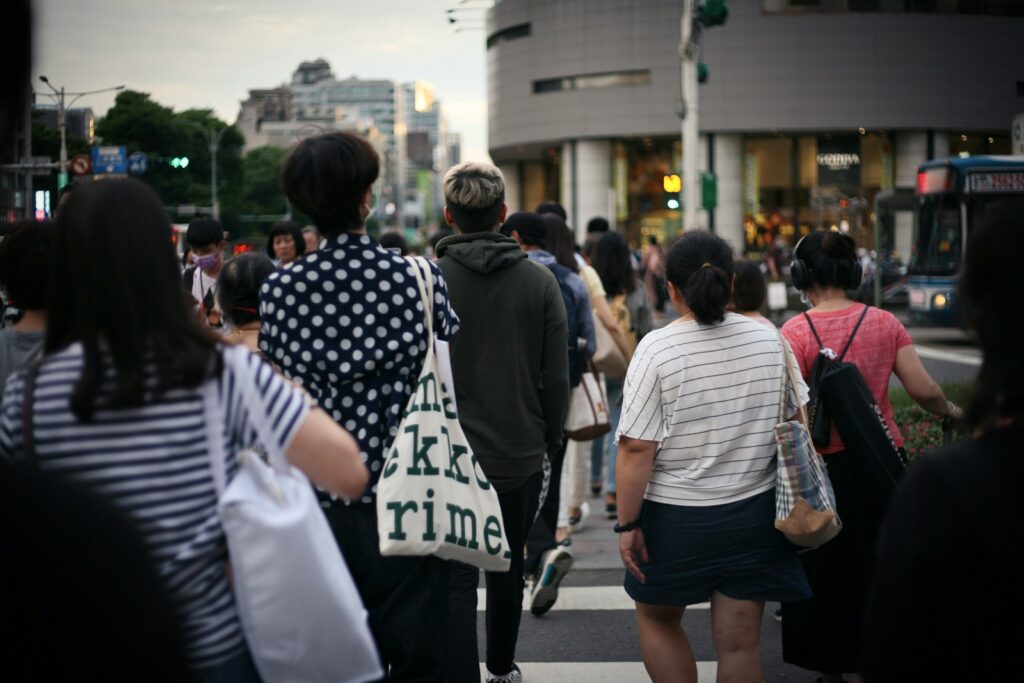
But apart from all this, it is also very difficult for foreigners to make friends in Japan. “No one really gets you, and no one is trying to get you.”
“I think it is difficult for anyone to make friends in Japan.”
“It’s gonna be difficult, you know, there might still be a wall, you know, like you are different from us.”
Look, Japan is already culturally very different from the rest of the world. But currently, a disease has spread there that can literally destroy their entire country. On September 1, 2019, a horrifying incident occurs in Japan’s Togane city. A 46-year-old man, Hisataka, is arrested because for a year after the death of his 86-year-old mother, Satoi Tanaka, Hisataka had kept her body at home. This is the phenomenon of “hikikomori,” a social malady in which the afflicted people have become modern-day ascetics who stay locked in the dark corners of their homes for months. They have no desire for any contact with any human being.
This is such a big problem in Japan that the government itself is now tired of issuing different schemes. Because the survival of their entire country is at stake. Birth rates are falling drastically. According to an official report by The Japan Times, today in Japan, there are 1.5 million hikikomoris between the ages of 15 and 64. That is, 2% of Japan’s entire population has become hikikomori. “Hito-kara” (solo karaoke), “hitori yakiniku” (solo barbecue restaurants), “hitori onsen” (solo hot spring baths) – many such activities that we usually do with our friends, but in Japan, a new market has opened up for doing these very activities solo. Even for highly personal and human needs like intimacy, you can rent anyone from a girlfriend, parents, to grandparents, just so they can talk to them for one or two hours for emotional intimacy.
Is the salary high enough to cover the cost of living in Japan?
But for a moment, a person can even manage the culture and office environment. But finance is the major criterion for which foreigners leave their own country and go to another. But right now, Japan is not actually able to offer this advantage to foreigners. “So I’m from Switzerland and I have been working in Japan for about a year now. Last year when I came here, I didn’t make any money at all.“
The majority of foreigners who come to Japan work in Tokyo and Osaka city. In Tokyo alone, 50% of Japan’s companies and 76% of MNCs are based. But it is exactly these two cities that are at the top ranking of the world’s most expensive cities. We calculated the basic monthly expenses like groceries, rent, etc., from Japan-based YouTubers, news reports, and even from online Japanese grocery stores and rental home websites to see exactly how expensive things are there. For a house literally the size of a bathroom, the minimum monthly rent here is 70,000 yen. We calculated many such small and big expenses ourselves, and according to that, the monthly cost of living in Japan came to 140,000 yen.
According to official data as well, the average cost of living in these Japanese cities is 130,000 yen. But the average salary here is only 300,000 yen. Meaning, almost 50% of your salary will go into expenses.
“Japan is so expensive. If you live like in the center of Tokyo, they’re going to be really, really expensive.”
“One-third of my salary goes to the rent. After that, one-fourth of it goes to like groceries, bills.”
How does Japan’s weak yen and stagnant economy affect foreigners?
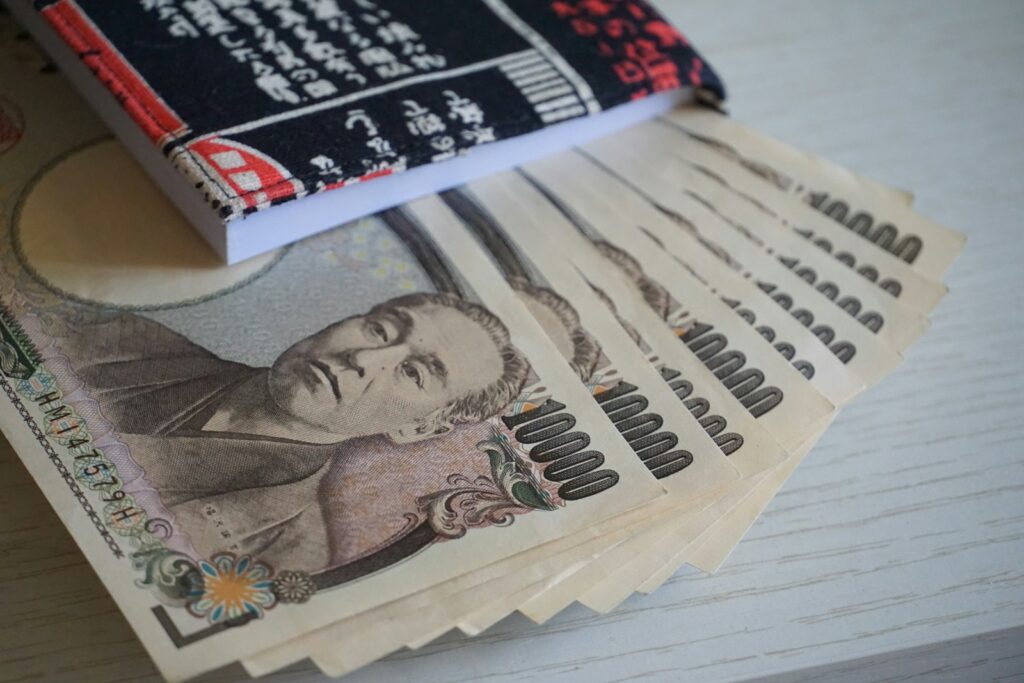
Now, I know you must be thinking that’s not too bad. I can still send 1.5 lakh yen back to India. But the yen is a very weak currency. Among all G7 countries, Japan is the only country where salaries have increased by only 10% on average over the last 30 years, which is almost negligible. Meaning, understand that someone who joined a job in 1990 with a salary of 300,000 yen, their salary after 30 years in 2020 would have become 330,000 yen.
Now tell me, why is any foreigner going to Japan?
To earn money and send it home, right?
But the Japanese yen is so weak that even if an Indian sends 10,000 yen to India, that money will become only ₹5,700 in India. And that is why, according to the Japanese media, their weak yen today has become the biggest reason why 91% of foreigners are leaving Japan and returning to their own countries. “What’s the biggest negative about living in Japan? Definitely the yen. Getting paid in Japanese yen. No, no, no, no. The conversion rate… if the yen was… a bit stronger, I would be jumping on that. But right now, it gets almost wise to go back home, unfortunately.“
Actually, the condition of the Japanese yen was not always like this. In 1980, Japan’s banks gave out a lot of indiscriminate loans against collateral, which created a huge asset bubble. But by 1991, the prices of land fell, people defaulted on their loans, and the economy crashed. This is called “The Lost Decade.” After this, to revive the economy, the Bank of Japan made interest rates zero and started printing money. But as a side effect, the yen became weak because investors started selling yen and buying stronger currencies. This went on for years, and the value of the yen kept falling.
Due to this, neither are foreigners able to earn money and send higher remittances to their own countries, nor are they getting salary hikes. This is the biggest reason why 91% of foreigners are saying that they are leaving Japan because of Japan’s stagnated economy.
How difficult is it to get Permanent Residency (PR) in Japan?
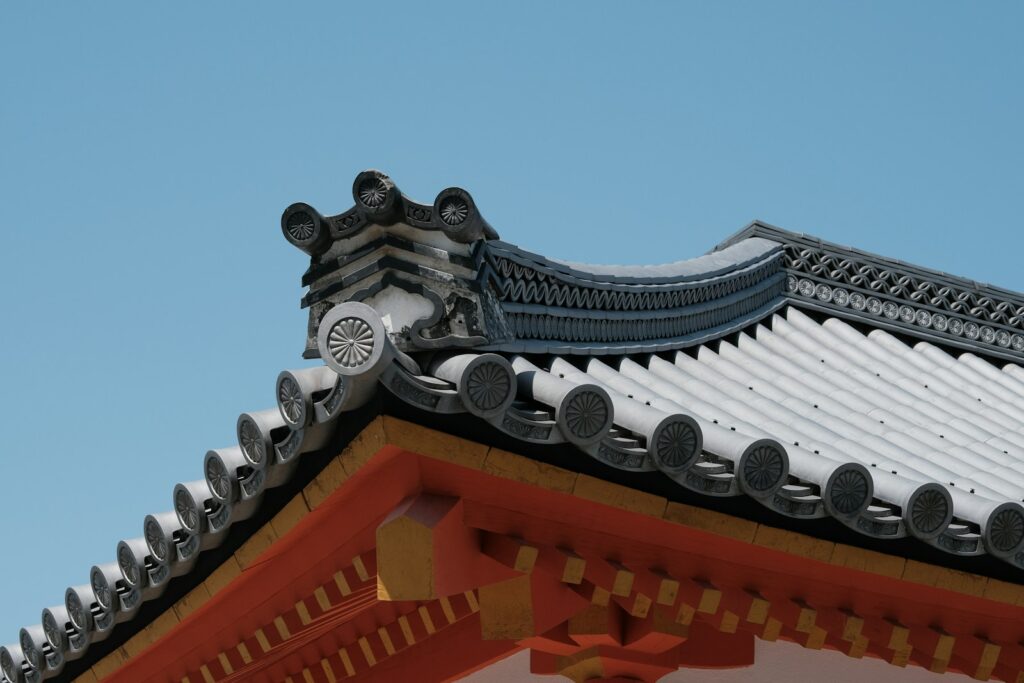
Last but not least, there is one more reason that has made it difficult for foreigners to live in Japan. That is its permanent residency criteria, PR. Japan’s PR criteria are so strict that for the last several years, only 50% of PR applications are getting approved. This is so low that even in some top European countries, the approval rate is around 90%.
The reason for this is that the process has been made very strict. First of all, you can apply for PR only after 10 years. In that too, if you have been outside Japan even once in the year before the application, the PR is rejected. Then, in the last 10 years, if you have paid your income tax or insurance premium late, again, PR rejected. And if by mistake you have got a traffic ticket two or three times, forget about PR.
Now, there are definitely two shortcuts here. Like, fall in love with a Japanese person, and you will get PR after marriage. But in this too, you have to prove to the government that your marriage is not fake. The other way is to become a great scientist or a rich business tycoon. This is also a reason why foreigners are leaving Japan.
Conclusion
Japan is one of the safest, cleanest, and most efficient countries in the world. Crimes here are negligible. Punctuality is high. Trains, metros, subways are all always on time. And discipline among people is extremely high. But now, this very culture of discipline in Japan is becoming a noose around its neck. Japanese people are not rude. They just respect their work, culture, and rules so much that their system seems rigid to foreigners. For many foreigners, even today, Japan is a dream destination. But when they face the rules of daily life, language barriers, or work pressure, they realize that Japan is definitely a perfect destination to visit, but living there is perhaps not for everyone.
















